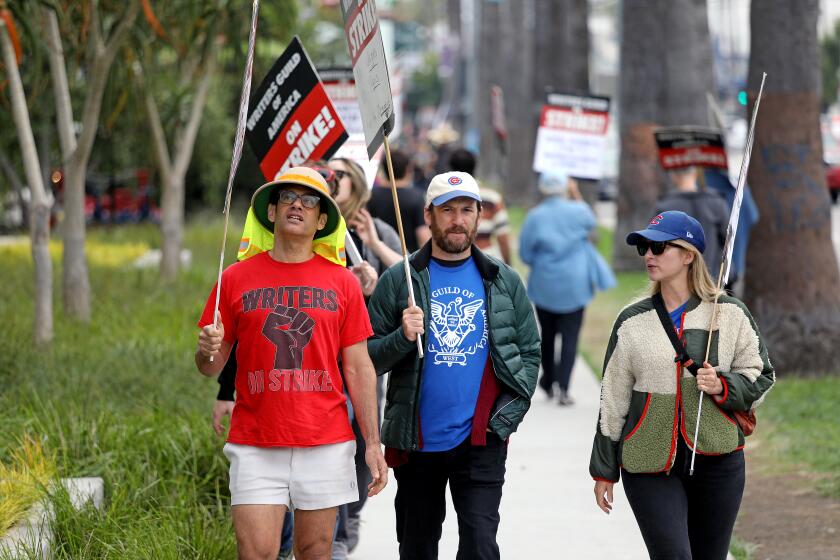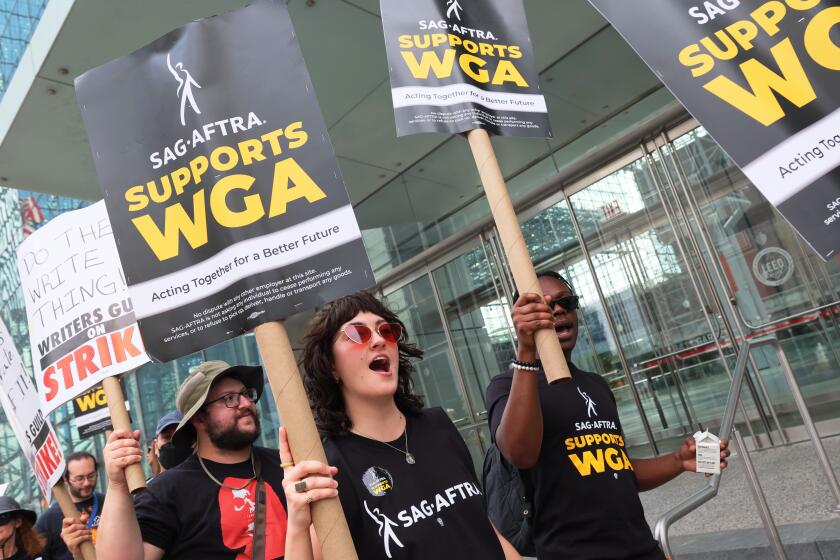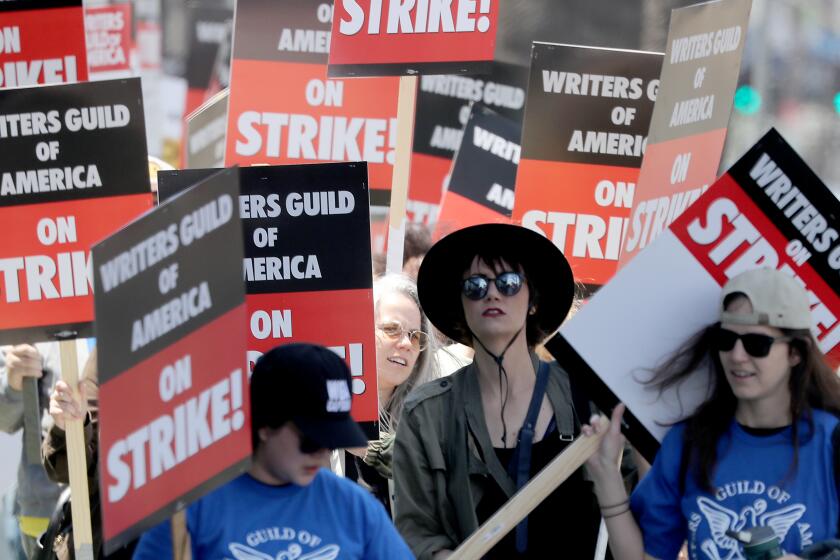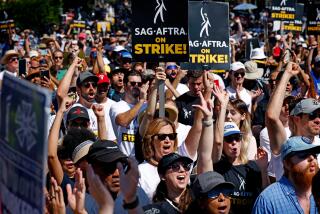A ‘hot labor summer.’ Hollywood unrest continues as actors vote to authorize a strike
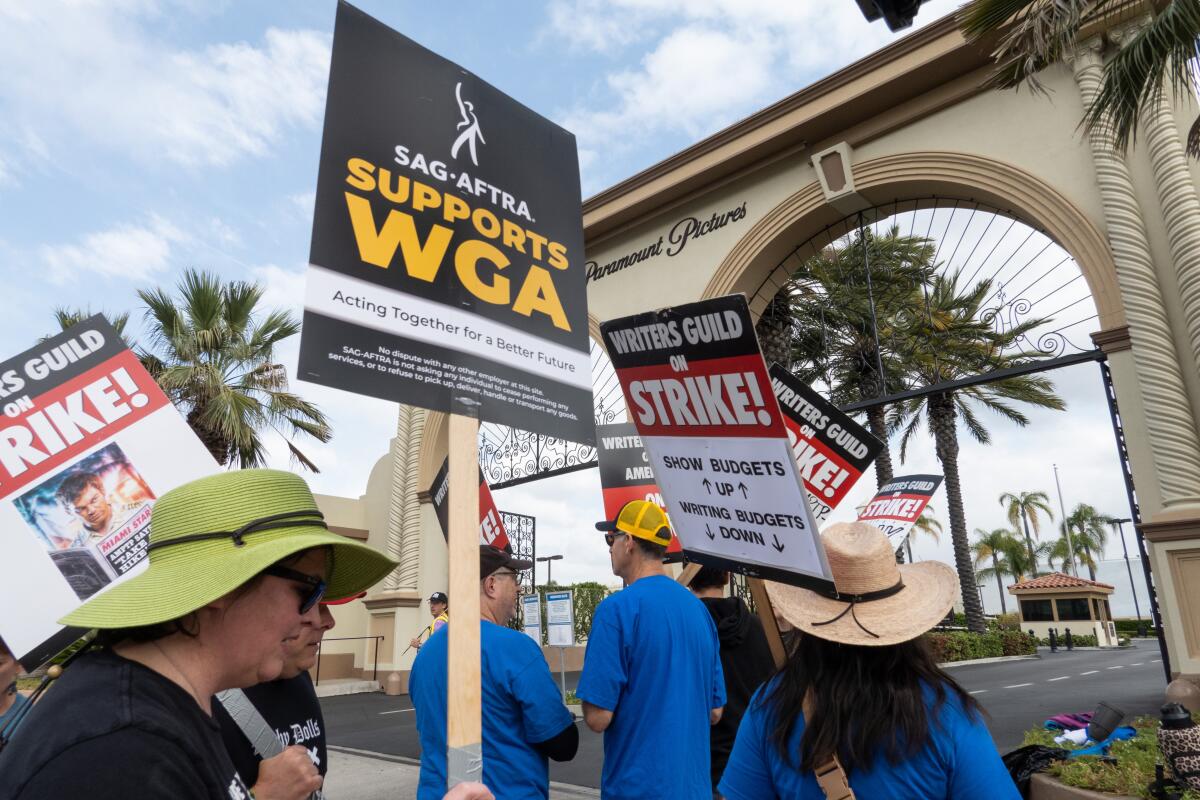
- Share via
As writers enter their sixth week of a strike, the season of labor discontent in Hollywood doesn’t appear to be winding down.
The Directors Guild of America, one of three unions seeking new contracts from the major studios, on Saturday announced that it had a “historic” deal for increased pay and conditions, with some significant gains in streaming compensation and other areas.
But the Writers Guild of America and SAG-AFTRA quickly poured cold water on any notion that the DGA pact with the Alliance of Motion Picture and Television Producers would apply to them. This was not like 15 years ago, they suggested, when a deal negotiated by the directors’ union created a template to end the previous writers’ strike.
“The AMPTP will not be able to negotiate a deal for writers with anyone but us,” the WGA said in a message to its members on Sunday.
“Our bargaining strategy has never relied upon nor been dependent on the outcome or status of any other union’s negotiations, nor do we subscribe to the philosophy that the terms of deals made with other unions bind us,” Duncan Crabtree-Ireland, SAG-AFTRA’s national executive director and chief negotiator, said in a statement Sunday.
If actors go on strike they would join Hollywood’s writers, who are entering their sixth week of a walkout.
And, on Monday night, SAG-AFTRA announced that its members have voted overwhelmingly (by a 98% margin) to give their leaders authority to call a strike if they can’t negotiate a new contract — even before negotiations are scheduled to begin Wednesday. The vote means the union’s leaders could call a strike after June 30, when their current contract expires, if no deal is reached by then.
“This overwhelming yes vote is a clear statement that it’s time for an evolution in this contract,” Crabtree-Ireland said. “This strike authorization means we enter our negotiations from a position of strength, so that we can deliver the deal our members want and deserve.”
In a statement, the AMPTP said: “We are approaching these negotiations with the goal of achieving a new agreement that is beneficial to SAG-AFTRA members and the industry overall.”
One person familiar with the negotiations who was not authorized to comment publicly said studio executives recognized every negotiation is unique, but were hopeful that the DGA deal addresses some common issues of concern between the guilds.
The focus on shutting down individual productions such as ‘The Chi’ reflects the more aggressive tactics being used by Writers Guild members compared to the previous strike in 2007-2008.
The threat of a strike by another Hollywood labor union adds to the pressure facing studios as they grapple with mass layoffs and restructuring. A strike by the actors would compound the production problems already triggered by the WGA strike, which has halted or disrupted many shows.
“If the actors go out on strike, it will shut the industry down,” said Steve Ross, a professor of history at USC. He predicts a protracted dispute between the studios and the unions.
“The studios are going to be in no rush, because they are trying to cut costs right now,” Ross said. “But at some point, they’re gonna have to come to the table.”
Actors have been vocal in their support of writers. Many famous actors such as Jason Sudeikis, Alfred Molina and Niecy Nash have walked WGA picket lines in recent weeks.
“Our fight is your fight, we are all in this together,” Crabtree-Ireland said at a union rally in downtown Los Angeles last month. “It’s going to be a hot labor summer.”
Actors share many of the same concerns as writers and directors, including boosting pay that has been eroded by inflation, regulating artificial intelligence and increasing residuals for shows that are distributed on streaming platforms.
“The writers, in trying to address some of these very serious economic equity issues, are not on the fringes,” Crabtree-Ireland said. “It’s not a coincidence that all of the creative workers in this industry are having problems with the way the employers’ business model has developed.”
The 2023 writers’ strike is over after the Writers Guild of America and the Alliance of Motion Picture and Television Producers reached a deal.
In their tentative agreement, the DGA achieved some notable gains in these areas, including wage increases, a new structure to pay foreign residuals and restrictions on the use of AI.
But the AMPTP has not agreed to tie residual pay to viewership, a key goal for the WGA.
And writers and actors have their own specific concerns, such as the size of writers’ rooms or the cost of self-tape auditions.
Since the pandemic, actors have been increasingly required to record their own audition tapes and the union has been working to limit the demands on performers.
David Smith, a professor of economics at Pepperdine University’s Graziadio Business School, said actors could join writers on the picket lines and expects the standoff could last longer than the 2007-08 strike, which ended after 100 days.
“I still think this could be somewhat drawn out,” Smith said. “It’s really a tough time for the studios to be giving in to some pretty significant, large demands.”
More to Read
Inside the business of entertainment
The Wide Shot brings you news, analysis and insights on everything from streaming wars to production — and what it all means for the future.
You may occasionally receive promotional content from the Los Angeles Times.
